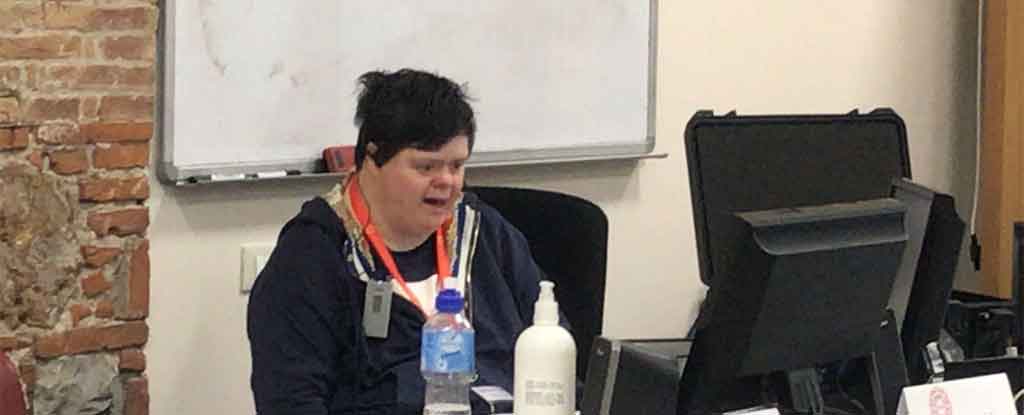
Train2Validate third multiplier event celebrated last April 7th in Pisa joined more than 30 professionals in the fields of linguistics and inclusive to learn about easy-to-read and the curricula that this Erasmus+ project develops for the roles of easy-to-read validators and facilitators.
The event was divided in two sessions. In the morning one, attendants were invited to translate a short text into easy-to-read. Before that, the writer and facilitator Francesca Stella, from ANFFAS, the Italian main organisation to support the rights of people with intellectual disability, shared her experience in both roles and offered her testimonial as an example of inclusion. The president of ANFFAS Udine and member of Inclusion Europe, Cristina Schiratti, led afterwards the exercise for the Italian participants. At the same time, Rocío Bernabé, from SDI Munich, and Óscar Garcia, from Plena Inclusión Madrid, explain the main guidelines for both stages: writing and design. They also propose an exercise in English for non-Italian attendants. At the end, all participants explained that a translation into easy-to-read is not easy and needs a deep reflection to organise ideas and use appropriate wording.
In the afternoon session, partners have presented the already published results and the next activities to be done. Óscar García explain the global project and Daniel Dejica, from UPT, summed the contents of the book published by the consortium. This book is an extended result of the Intellectual Output 1, dedicated to conduct a survey to gather information about current training experiences for easy-to-read validators and facilitators in Europe. The book contains individual chapters about the methodology, the participant countries and a global analysis of all data.
Carlo Eugeni, from SSML Pisa, has explained the main details of the next curricula for easy-to-read facilitators and validators. Based on the skills cards presented in an event in Madrid in October 2021, these curricula show the specifications for learning materials, assessment, teaching strategies and, above all, the ECTS/ECVET credits applicable to the expected learning outcomes that the trainees have to overcome.
The round of conferences closed with Piero Cavallo, from SDI Munich, that explained the different kind of educational resources that the Train2Validate project will develop in the next months. The first half will be shared in a next event in November in Munich and the second half in the last project event in June 2023 in Slovenia. Finally, Angela Cotoara, from Fundatia Professional, explained the strategy to assess the training for validators. The trainees will test the course through a digital platform and the project partners will deliver a full learning outcome with their learning materials and a simulation of exam.
In the last part of the event, Carlo Eugeni and the researcher of the University of Florence Luciana Forte chaired a round table with Cristina Schiratti, Óscar García, Angela Cotoara, Tatjana Knapp, from Zavod RISA, and Floriana Sciumbatta, from the University of Trieste. The discussion tackled with issues as the communication with people with more needs, the communication in medical environments and the projection of validation as an activity included in easy-to-read. All participants in the round table agreed the importance of increase the awareness about an easy communication in medical and administrative environments and the relevance of validation for employment inclusion and to guarantee the suitability of easy-to-read texts.

